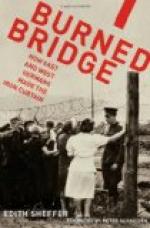Sometimes he would have a vivid flash of jealousy when he thought about her and Tommy Ashe, when he recalled her admissions. And he would soften from that mood, twisting his lips wryly, when he remembered the pitying tenderness of her good-by.
He could not in the least understand the girl nor her motives, any more than he could understand the transformation that he felt vaguely was taking place in himself. She was too wise for her years and her experience. There was a stinging truth in some of the things she said. And it was his fault, not hers, that they were unpalatable truths. What did a man like himself have to offer a girl like her? Nothing. She had his measure in everything but sheer brute strength, most of all in the stoutness of her resolution. For Mr. Thompson, pondering soberly, realized that if he gave free play to the feelings Sophie Carr had stirred up in him, there was no folly he was not capable of committing. He, whose official creed it was to expound self-denial, would have followed his impulses blindly. He would have married out of hand.
And after that, what?
He could not see clearly, when he tried to see. He was no longer filled with the sublime faith that a beneficent Providence kept watch and ward over him, and all men. He was in fact now almost of the opinion that both sparrows and preachers might fall and the Great Intelligence remain unperturbed. It seemed necessary that a man should do more than have faith. He must imperatively make some conscious, intelligent effort on his own behalf. He was especially of this opinion since the Board of Home Missions had overlooked the matter of forwarding his quarterly salary on time. The faith that moveth mountains was powerless to conjure flour and sugar and tea out of those dusky woods and silent waterways—at least not without a canoe and labor and a certain requisite medium of exchange.
No, he did not blame Sophie Carr for refusing to allow her judgment to be fogged with sentiment. He only marvelled that she could do it where he had failed. He could not blame her—not if his speech and activities since he came to Lone Moose were the measure of his possible achievement.
He was taking grim, unsparing stock of himself, of what he had, of what he had accomplished altogether, by this time. It was not much. It was not even promising. A theological education, which, compared to the sort of culture Sam Carr and his daughter had managed to acquire, seemed rather inadequate and one-sided. They knew more about the principles he was supposed to teach than he knew himself. And their knowledge extended to fields where he could not follow. When he compared himself with Tommy Ashe—well, Tommy was an Oxford man, and although Oxford had not indelibly stamped him, still it had left its mark.
These people had covered all his ground—and they had gone exploring further in fields of general knowledge while he sat gazing smugly at his own reflection in a theological mirror. Upon that score certainly the count was badly against him.




